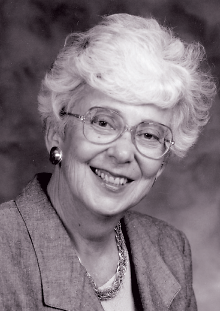Kathleen Mogul, M.D., Pioneering Psychiatrist, Dies
Abstract
Her childhood experience as a refugee from Nazi Germany helped to shape a sensibility profoundly dedicated to justice, professional ethics, and compassion.
Kathleen Mogul, M.D., a former APA trustee and a pioneer in women’s mental health and the advancement of women as leaders in psychiatry, died August 13 at her home in Newton, Mass. She was 89.

Mogul was an Area 1 Trustee from 1997 to 2003 and more recently a member and chair of the APA Elections Committee. She was president of the Massachusetts Psychiatric Society for the 1995-1996 term. A refugee from Nazi Germany, Mogul attended Barnard College and was later one of the first women to graduate from Harvard Medical School.
She is survived by her husband, Louis Mogul, M.D., a distinguished psychoanalyst and child psychiatrist; three children; and six grandchildren.
According to an obituary that appeared in the Boston Globe, Mogul “spent her early years in Berlin and fled with her family from Nazi Germany in 1938 on an odyssey that took them from Berlin to Budapest to Baghdad to Basra and finally to Bombay, where they were able to secure passage on a ship to New York in early December 1941, just days before the attack on Pearl Harbor.”
Mogul trained during the late 1960s at the Massachusetts Mental Health Center along with a remarkable number of young psychiatrists who would go on to become leaders in APA—including former presidents Steven Sharfstein, M.D., Carol Nadelson, M.D., Lawrence Hartmann, M.D., and Alan Schatzberg, M.D.
“It was an exciting time in a very strong training program that populated the ranks of APA leadership,” recalled Nadelson, the first woman APA president and a longtime friend of Mogul’s. “Kathy was witty and engaging with a sharp insight. She wasn’t shy about speaking out about the issues she believed in.”
Nadelson said Mogul’s longtime career interests were psychiatric ethics, education, and the promotion of women within the ranks of psychiatry. She added that Mogul’s childhood experience as a refugee helped to mold a sensibility profoundly committed to justice, ethics, patient rights, and compassion.
As Mogul became more infirm in the past year, Hartmann and Nadelson would often visit and share dinner with Mogul and her husband.
“Kathy and I were good friends for 50 years,” Hartmann told Psychiatric News. “She was a highly intelligent listener, tough, complex, and with good values. Again and again, she helped the APA Assembly and Board to pay attention to patients and to think through and develop solid positions about women, about minorities, and about ethics.” ■



